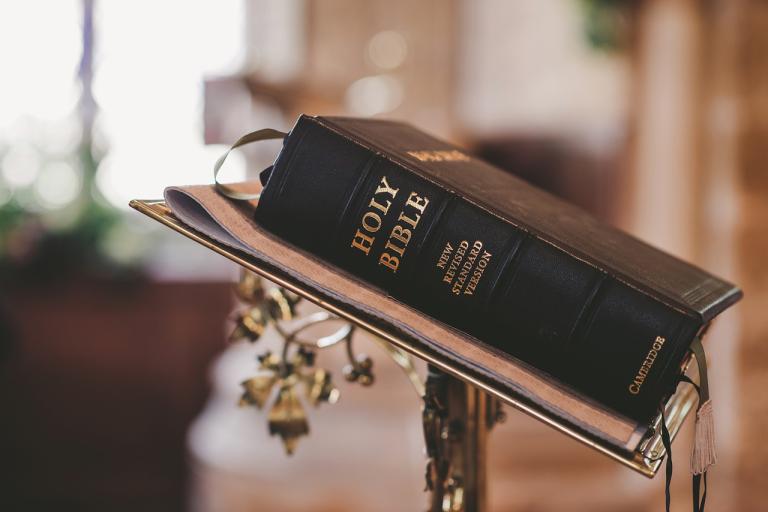
Anyone who knows me knows that I don’t believe the Bible is the inerrant, infallible, inspired Word of God. In fact, I’ll take that one step further: If you believe the Bible is the inerrant, infallible, inspired Word of God, you run the risk of causing harm to yourself and others based on what’s in it. It’s full of misogyny, racism, violence, bigotry, human sacrifice, and bears who maul children at the request of God’s prophets.
However, as the title of this article suggests, I am going to be doing something I don’t generally do – defend the Bible. Or, rather, a certain approach to the Bible.
First off, let’s put aside all the many issues that come with canonicity. This piece isn’t about that. For our purposes today, it doesn’t matter if your Bible has 66 books or 81. Let’s also put aside all the many contradictions, both historical and theological. Again, those don’t matter.
Now, let’s step back out of the trees so we can see the entire forest. What do you notice?
What I see is a very complex and winding story that ebbs and flows like any good story does. It’s chock full of drama and plot twists, and even has a surprise hero at the end of it.
But more than all this, it’s often from the perspective of the victims.
From the get-go, this is the angle it takes. Genesis 1 comes about during the Babylonian exile, where the Hebrew people were living in a foreign land, devoid of their home. The Cain and Abel story, which is just another founding murder myth, actually hears from the victim: “His blood cries from the grave.” This is unique when compared to other founding myths. Joseph, the brother left for dead, is the one who rises to power in Egypt, not the powerful brothers who tried to off him. And speaking of Egypt, that whole narrative is about an enslaved people who rise up against Empire and who break free from oppressive systemic and systematic racism and bigotry (a story I’m sure our Black brothers and sisters would quickly recognize and appreciate).
Again, while I’m not saying these stories are theologically or historically perfect, I am saying that they matter. But they only matter when we don’t mistake the forest for the trees. In other words, when we can see the overarching narrative and not get bogged down by the confusing details, that’s when we can start to see a pattern emerge.
And this pattern, though it sometimes emerges subtly, is fairly obvious. Put simply, it’s a pattern that moves us, step by baby step, toward being more loving, empathetic, and compassionate people. It’s a pattern that moves us away from Imperial systems of oppression and toward a type of voluntary communistic societal structure. It’s a pattern that challenges the status-quo systems of the “power over” model and eventually embraces a “power with” one. It’s a pattern that blows apart our theological presuppositions that the gods are angry, wrathful, and full of malice, desiring, above all else, greater and greater sacrifices, eventually embracing the God who rejects the ultimate human sacrifice.
But again I reiterate: It does NOT always get things right. In the midst of this incremental move from one place to another, it also involves stories that run counter to the overarching narrative. This is to be expected, however, whenever you have humans telling stories. We are a messy species with a messy spirituality and messy anthropology, not to mention a very messy psychology. That means our books will also be messy.
Of course, I can already hear my detractors from both sides of the aisle. The Christian fundamentalists will say that I’m diminishing the Bible by rejecting inerrancy while the atheists will call me just another Christian apologist. In reality, I’m doing neither. In rejecting inerrancy, I am not diminishing the Bible, but elevating it to its proper place. It is a fascinating text with a very good message, but only when it’s read outside of the lens of inerrancy and infallibility. And I am no Christian apologist. I just don’t want to be yet another man with privilege who takes away a set of texts that speak out against systems of oppression. That wouldn’t be very intersectional of me.
That’s why I let the Bible be what it is: an imperfect book written by imperfect people, one that can only be appreciated if we don’t get mired down by the relatively modern notion of biblical inerrancy and infallibility. We have to step back, take in the whole view, and notice the patterns – especially the ones that take stock of the perspective of the victims of systemic oppression. Because to my mind, that’s the lens through which we view the whole thing, and that’s how we distinguish the good stuff from the junk.
Agree or disagree? Let me know in the comments.
Until next time.
If you wanna get to know me better, please follow me on social media. I’m pretty active on all platforms:
Also, if you’ve been digging my work on here, and want to see me be able to continue writing as close to full-time as humanly possible, please take a look at my Patreon page at www.patreon.com/mjdistefano. Even $1 a month helps bigly!!!














